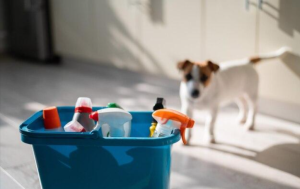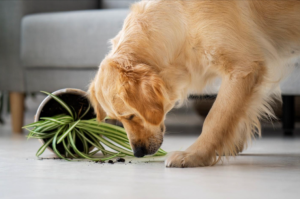
Pets bring endless joy and unconditional love into our lives, but hidden dangers often lurk in even the most well-kept homes. Seemingly harmless everyday items from cleaning supplies to certain human foods can pose serious risks to curious cats and dogs. In this comprehensive guide, we’ll explore the most common household toxins, describe their impact on pets, and provide you with actionable steps to keep your furry friends safe. We’ll also highlight why partnering with a professional veterinary clinic is essential for preventive care and emergency treatment.

Quick-Reference Chart: Most Common Household Toxins
Sometimes, you need info at a glance especially during a potential poisoning crisis. Use this chart to quickly identify dangers, possible symptoms, and immediate actions:
| Toxin | Sources | Symptoms | Immediate Action |
| Chocolate | Candy, desserts | Vomiting, diarrhea, elevated heart rate, seizures | Contact a vet clinic immediately |
| Grapes/Raisins | Trail mix, baking ingredients | Vomiting, lethargy, loss of appetite, kidney issues | Seek professional veterinary clinic care |
| Onions/Garlic | Table scraps, soups, seasonings | Weakness, pale gums, rapid breathing (anemia) | Call vet; avoid further ingestion |
| Bleach/Ammonia | Cleaning products | Drooling, burns, coughing, difficulty breathing | Rinse skin/fur; urgent veterinary consultation |
| Lilies | Decorative houseplants (esp. for cats) | Vomiting, lethargy, kidney failure (cats) | Remove plant; contact vet ASAP |
| Antifreeze | Car maintenance fluid (often in garages) | Lethargy, incoordination, seizures, kidney failure | Prevent further ingestion; go to vet clinic |
| Xylitol | Sugar-free gum, sweets, some peanut butter | Tremors, seizures, sudden drop in blood sugar | Emergency vet visit: time is critical |
Understanding Household Toxins
Common Sources of Toxic Exposure
A wide range of substances can harm pets if ingested or inhaled, including:
- Cleaning agents (bleach, ammonia, detergents)
- Human foods (chocolate, grapes, onions, xylitol-sweetened products)
- Household plants (lilies, aloe vera, sago palms)
- Automotive chemicals (antifreeze, brake fluid)
- Pest control products (rat poison, insecticides)

Pro Tip: Store all potentially toxic materials in elevated cabinets with child- or pet-proof locks. This simple step can significantly reduce accidental poisonings.
How Toxins Affect Pets
Pets have different metabolic pathways and body sizes, making them more vulnerable to certain chemicals compared to humans. For instance:
- Chocolate contains theobromine and caffeine, which can elevate heart rates in dogs and lead to neurological symptoms like tremors and seizures.
- Lilies are extremely toxic to cats; even minimal exposure can result in severe kidney damage.
- Xylitol causes a rapid insulin release in dogs, leading to dangerously low blood sugar levels.
Damage can range from mild stomach upset to organ failure—so it’s vital to act fast if you suspect poisoning.
Recognising Symptoms of Poisoning
Even the most vigilant pet owners can face unexpected accidents. Stay alert for these common signs of poisoning:
- Gastrointestinal issues: Vomiting, diarrhea, excessive drooling
- Neurological signs: Tremors, seizures, incoordination
- Respiratory distress: Coughing, wheezing, difficulty breathing
- Behavioural changes: Unusual lethargy or hyperactivity, whining, pacing
- Physical indicators: Pale gums, rapid heart rate, excessive thirst
If you spot any of these, call your professional veterinary clinic for guidance and be ready to describe the suspected toxin.
Prevention and Safety Measures
Pet-Proofing Your Home
- Secure Storage: Keep cleaning agents and chemicals behind locked or elevated cabinets.
- Childproof Locks: Install them on lower doors if you have especially curious pets or large breeds capable of opening cabinets.
- Inaccessible Trash: Use covered or locked trash cans to prevent rummaging.
- Food Awareness: Clearly label containers with human foods that could be toxic and never leave chocolate or grapes unattended on countertops.
“Preventive measures are often overlooked. Simply securing household chemicals and routinely scanning for hazards can save your pet’s life.”
Safe Storage of Hazardous Materials
Organising hazardous substances properly reduces your pet’s risk of accidental exposure:
- High Shelves or Locked Closets: Keep automotive fluids, pesticides, and DIY chemicals stored safely out of paw’s reach.
- Sealed Containers: Ensure products aren’t leaking or left in open containers. Pets can be drawn to sweet-smelling antifreeze or leftover chemical residues.
- Regular Checks: Inspect containers for damage or leaks. Move expired or infrequently used items to a locked storage area.
Creating a Pet-Friendly Environment
Designing a home that’s both inviting and safe for your four-legged family members helps prevent poisoning incidents:
- opt for Pet-Safe Plants: Spider plants, Boston ferns, and African violets are safer alternatives to lilies or sago palms.
- Hide Electrical Cords: Tape them to baseboards or use cord protectors.
- Tidy Up Small Objects: Buttons, pins, coins, or children’s toys can be choking hazards.
- Elevated Pet Zones: Provide cat towers or dog-friendly spaces where pets can relax away from high-traffic or high-risk areas.
Role of a Professional Veterinary Clinic
Immediate Actions After Exposure
Time is critical if you suspect your pet has ingested or come into contact with a toxin:
- Remove the Source: Ensure your pet no longer has access to the substance.
- Contact a Vet Clinic: Provide as much info as possible name of the toxin, amount ingested, and time of ingestion.
- Follow Instructions: Do not induce vomiting unless explicitly advised. Some toxins can cause more harm if vomited.
- Stay Calm: Pets pick up on stress, which can worsen their condition.
Benefits of a Professional Veterinary Clinic
A professional veterinary clinic offers multiple advantages for managing poisoning incidents:
- Diagnostic Tools:Blood tests, X-rays, and ultrasounds to identify toxin presence or organ damage.
- Specialized Treatments: Antidotes, intravenous fluids, or medication to manage seizures.
- Ongoing Care:Post-recovery monitoring ensures your pet’s organs are functioning properly.
- Tailored Advice: Vets can recommend preventive steps for the future, such as diet changes or safer home products.

Emergency Response and Treatment
First Aid for Poisoned Pets
While you’re preparing to head to the vet:
- Rinse Off Chemicals:Use lukewarm water to remove residue from skin or fur.
- Keep Your Pet Warm and Calm: Stress can escalate symptoms.
- Collect Evidence:Bring packaging or a sample of the suspected toxin to the clinic for faster identification.
When to Visit a Vet Clinic
Immediately visit a vet if you notice:
- Persistent vomiting or diarrhea (especially with blood)
- Seizures or tremors
- Laboured breathing
- Extreme lethargy or collapse
- Exposure to known toxic items like antifreeze, xylitol, rodenticides, etc.
Early intervention often makes the difference between a swift recovery and more severe complications.
Long-Term Care and Recovery
After acute treatment, some toxins (e.g., rat poison or certain plants) can leave lingering damage:
- Follow-Up Visits:Blood tests or additional exams monitor organ function.
- Medication Adjustments: Vets might prescribe supplements or meds to rebuild organ health.
- Dietary Support:Special diets can aid recovery, especially if kidneys or liver were impacted.
- Rest & Gentle Activity:Let your pet heal at their own pace with minimal stress.
Educating Pet Owners
Myth vs. Fact
- Myth: “It’s fine to give your pet human medication like ibuprofen.” Fact: Human meds are often toxic to animals. Always consult a vet before administering any medication.
- Myth: “Milk helps pets after poisoning.” Fact: This can worsen certain poisonings. Seek professional veterinary advice instead of home remedies.
- Myth: “Only obvious chemicals are dangerous foods are safe.” Fact: Some foods (like chocolate, grapes, onions) are among the most common causes of poisoning in pets.
Conclusion
Keeping our pets safe from hidden household hazards is a shared responsibility. By identifying common toxins, understanding symptoms of poisoning, and knowing when to contact a vet clinic, you can drastically reduce risks. A bit of forethought—like locking away cleaning supplies, avoiding dangerous plants, and labelling off-limits foods—goes a long way toward protecting your four-legged companion.
When accidents do happen, immediate veterinary care can be lifesaving. Our professional veterinary clinic stands ready with emergency treatment options and expert guidance. With a reliable veterinary care, you’ll provide your furry friend the secure, joyful life they deserve.
Ready to Safeguard Your Pet?
Schedule a Consultation: Let our experts identify hidden dangers in your home.
Join Our Community for more tips: https://petshaven.ae/blog/